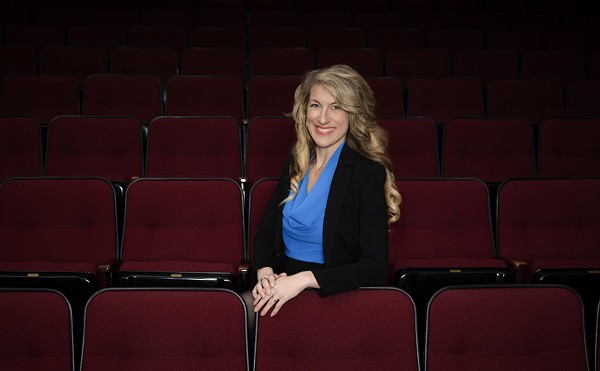Patrick (Reginald Pierre) is a painter who has sequestered himself in his studio since the death of his friend and mentor, Dr. Miller (Ron Haglof), partly out of grief, partly because Patrick is suspected of killing Miller. Patrick's solitude is broken by the arrival of Bouchard (Tom Kopp), an art authenticator who announces to Patrick that he has "completed" Dr. Miller's lifelong quest to find a missing self-portrait of Van Gogh (Jake Ferree) — all Patrick has to do is anonymously paint the fictional painting and the money will roll right in.
That's the fairly simple setup for Steven Dietz's Inventing Van Gogh, but it laboriously devolves into a time-traveling art-history mystery, as Patrick begins to hallucinate Van Gogh, and Van Gogh hallucinates Patrick in his time. The essential question of the play is the myth and mystery of Van Gogh himself. How did an artist whose work was reviled in his time become a renowned master painter in death? This mystery is often obscured behind the McGuffin of the "does it or doesn't it exist" nature of the last self-portrait.
Many an argument is waged on this very topic by Patrick and Dr. Miller, Patrick and Bouchard, and Patrick and Van Gogh. That's the fault of Dietz, a playwright who sometimes seems to chew over a big topic (Art! Life! Fame!) for far too long, only to spit it out, unresolved and undigested, and then hide it under his napkin. To their credit, director Steve Callahan and the actors in this West End Players Guild production make some of these arguments bracing and compelling.
Pierre and Ferree, in particular, share a powerful scene in which the modern artist professes his hatred for Van Gogh's "brute force and pigment" painting style. Ferree responds with naught but a bemused stare and the briefest suggestion of a smile — his Van Gogh has heard it all before, and yet his love of his paintings remains intact.
Ferree's is a remarkable portrayal of a man much portrayed on stage and screen, and it is distinctive because all of his energy is channeled through his hands and shoulders. Hands smeared with paint up to his elbows, he walks briskly, stops abruptly and squares himself to every subject, be it canvas, argument or the subject of his deepening mental illness. Then he licks the tip of his brush and unhesitatingly paints with the surety of a practiced hand.
Kopp's portrayal of the sly and assured Bouchard is only fully appreciated once he assumes the role of the restless and reckless Paul Gauguin, who briefly lives with Van Gogh. The two artists argue about the meaning of painting and the value of technique during a drunken night in which Patrick is an active participant (he sides with Gauguin). Kopp sprawls across most of the stage, shouting broad pronouncements about the primacy of ignorance in making art, the need to destroy all heroes and the value of imagination. It's a marvelously entertaining (if protracted) play-within-the-play, and it beats the rest of the evening like a rug. Enjoy it while it lasts, because soon enough it's abandoned for the prosaic mystery-painting story line, and all that entails.





